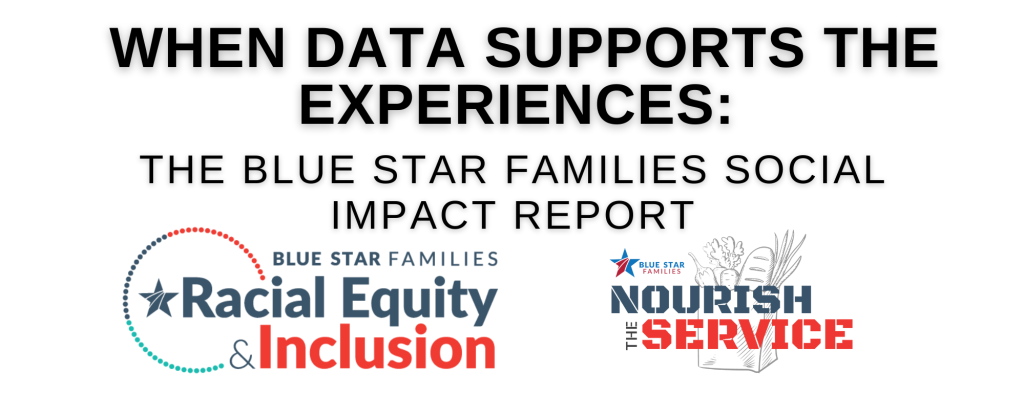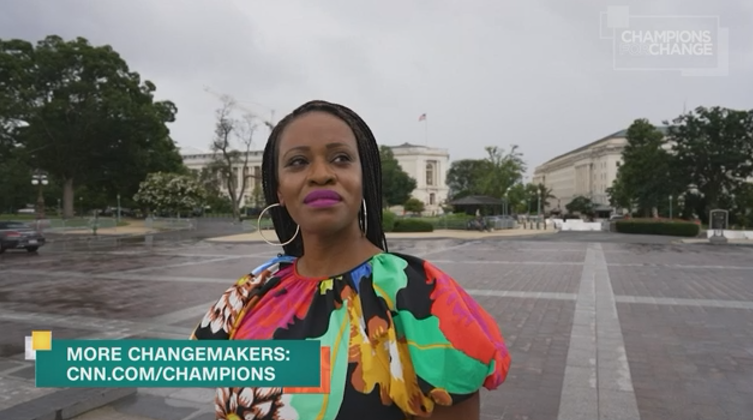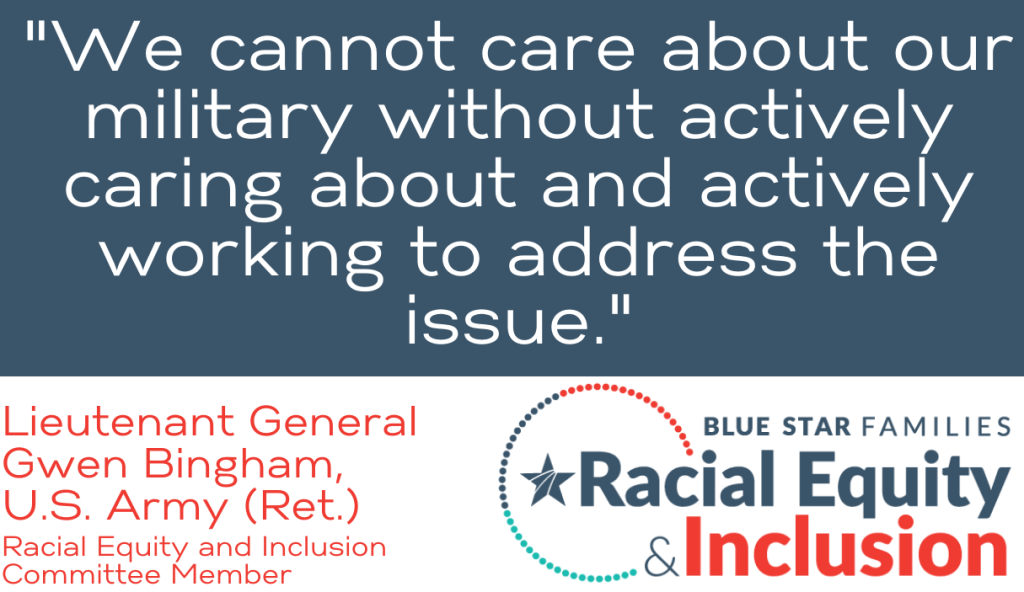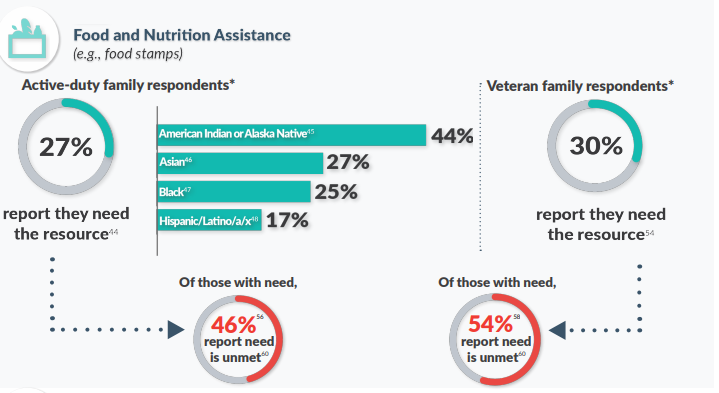Published: March 21, 2022

When Data Supports the Experiences: Blue Star Families’ Social Impact Report
As part of Blue Star Families’ Racial Equity & Inclusion Initiative (REI), the organization hosted a virtual two-day event in February to release a report titled, Blue Star Families’ Social Impact Research 2021: The Diverse Experiences of Military & Veteran Families of Color. The results release event highlighted the presentation of the findings, questions answered by a panel made up of researchers and contributors to the report, stories shared by REI Committee members, and recommendations moving forward. While conversations around the experiences of military and Veteran families of color can be difficult, they address a blind spot that can improve quality of life and readiness, which is essential.
Along with research, the REI works to develop leaders. The DEPLOY (Diversify and Expand the Pipeline of Leaders of Your Military Community) Fellowship Program is a key part of that initiative. In 2021, the inaugural cohort of 11 DEPLOY Fellows hit the ground running, focusing on Chapter support, the outdoors, technology, financial wellness, mental health, food insecurity, and applied research.
Charo Bates, USAA Applied Research and Social Impact DEPLOY Fellow, worked with Blue Star Families’ Applied Research team to field the social impact survey, analyze results, and create the comprehensive report.

Charo was featured on CNN’s Champions for Change in October 2021. Watch it here!
“My role in the fellowship consists of engagement as a member of the Applied Research and Policy team,” Charo shared. “My contribution to the social impact report involved drafting a finding surrounding medical and mental health care for military families of color. This encompassed a process of analysis of the data, translating it into understanding their/our experiences and meaningful writing.”
During the process of analyzing the results, Charo was struck by the way the responses impacted her. “[S]ome were so traumatic that it left me wondering how we would be able to translate that so that the power behind the responses wasn’t lost,” she said. “I wanted to make sure that when the audience read the report, they also felt the emotions attached to it.”
According to the survey, nearly half of active-duty (46%) family respondents of color report that they have considered racial/ethnic discrimination when submitting base/installation preferences, and 42% consider concerns about safety due to their (or their family’s) racial/ethnic identity (Blue Star Families, 2022). Basic decision-making is impacted by experiences in civilian communities for families of color. And Charo can relate. “I live their experiences firsthand, so it was like seeing my thoughts on paper,” she shared.
The experiences of military and Veteran families of color have not been the focus of survey data before, and the mission behind this report is to bring to light the challenges military and Veteran families of color face – challenges like food insecurity.

Diving into Findings Related to Food Insecurity
While we already knew that food insecurity is present at an alarming rate, what many are not aware of is that active-duty family respondents of color report twice the level of food insecurity as their white, non-Hispanic counterparts (Blue Star Families, 2022, p. 46). Furthermore, active-duty and Veteran respondents report similar levels of need for food and nutrition programs, but a greater proportion of Veterans report that their needs are unmet.

There is also a lack of connection between resource-sharing organizations and families who need the resource. One of the top reasons for not accessing food and nutrition programs is: “I didn’t think I was eligible for this service.” (Blue Star Families, 2022, p. 47)
What does this mean for your community? There could very likely be families in your squadron/platoon/division who are experiencing food insecurity and have unmet needs.
If you want to help, here are a couple of tips:
- Share resources with dignity in mind. When people are facing food insecurity, there is often embarrassment and shame that accompanies the stress. Don’t make assumptions, but make sure everyone knows what kind of resources are available – whether they need them or not.
- Confront your own biases. We all have biases. Regardless of the reasons why you think a family is experiencing food insecurity, keep in mind that food insecurity presents a vulnerability that affects the military as a whole. No family should struggle to put food on the table, and if they are struggling, it can impact mission readiness and national security.
- Watch what you say. Comments on social media can easily be seen by your community. Some people think food insecurity is a result of poor financial management, and stating those opinions (which are not true) can further stigma and shame, and send a message that you aren’t a safe person to reach out to. If you see comments like this, confront them. Point to the data.
Most people care very deeply about our military-connected community, and are shocked and saddened to hear about families struggling with food insecurity. It’s up to all of us to learn more, share resources, and confront food insecurity head on.
Blue Star Families has high hopes for the report and the social impact research to follow, as does Charo, who hopes it leads to change, awareness, and continued cultural competency within the military and Veteran community.
To explore the full report and virtual event replays, visit Blue Star Families’ REI webpage.
Thank you to Amazon and the Craig Newmark Foundation for sponsoring Blue Star Families’ Food Insecurity DEPLOY Fellowship!
References
Blue Star Families. (February 2022). Blue Star Families’ social impact research 2021: The diverse experiences of military families of color executive summary. https://bluestarfam.org/wp-content/uploads/2022/02/BSF_MFC_REI_FullReport2021-final.pdf
Blue Star Families. (2021, December 31). Racial Equity & Inclusion: About. Retrieved March 1, 2022, from https://bluestarfam.org/racial-equity-initiative/about/
Posted In: Food Insecurity

